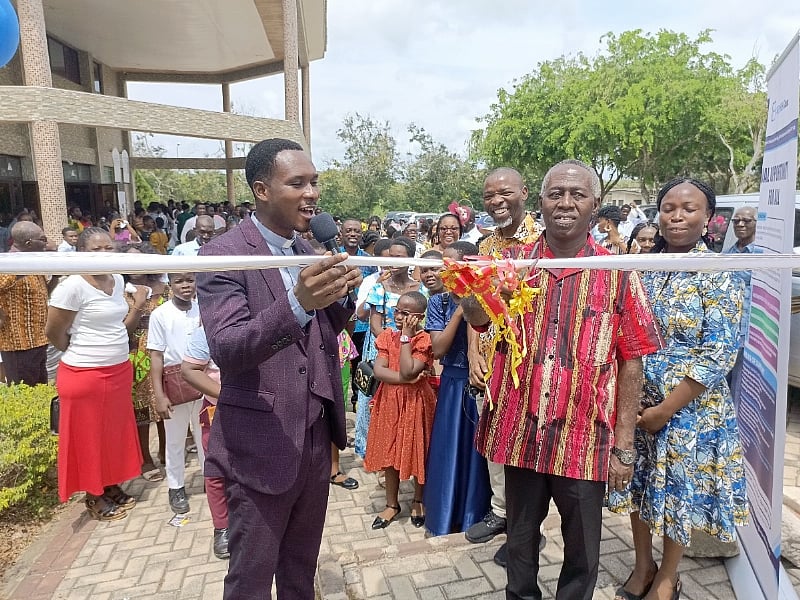The University Interdenominational Church (UIC) at the University of Cape Coast has embarked on a transformative journey to empower its members with employable skills and entrepreneurial opportunities through the Training, Exhibition, Competition, and Support for Livelihoods (TECS4Live) initiative. This multifaceted program, culminating in a vibrant trade fair held on March 30, 2025, aims to equip church members, particularly the youth, with the necessary tools to navigate the challenging economic landscape and create sustainable livelihoods. The initiative reflects a deep understanding of the socio-economic realities facing Ghanaian youth and the church’s commitment to providing practical solutions rooted in faith and action.
TECS4Live operates on a four-pronged approach: training, exhibition, competition, and support. The training component offers both short-term and long-term courses. Short-term training focuses on equipping exhibitors with the skills to effectively present their products and engage potential customers, while long-term training provides in-depth instruction in various practical skills, including fruit and vegetable processing, online business management, and home gardening. This dual approach caters to both immediate needs for market participation and the development of long-term entrepreneurial capabilities. The program recognizes that effective presentation and marketing are crucial for business success, while diversified skill sets provide a broader foundation for sustainable income generation.
The annual exhibition serves as a dynamic platform for participants to showcase their products and connect with potential investors, financial institutions, and other stakeholders. This marketplace environment facilitates networking, collaboration, and access to valuable resources. It brings together a diverse audience, creating opportunities for participants to gain market exposure, receive feedback on their products, and explore potential partnerships. The exhibition not only celebrates the entrepreneurial spirit within the church community but also promotes a culture of mutual support and economic empowerment.
The competitive aspect of TECS4Live encourages innovation and rewards entrepreneurial excellence. Participants are challenged to develop business plans that address specific challenges, with winning entries receiving financial backing and mentorship. This element of competition fosters creativity, promotes strategic thinking, and provides the necessary support to transform innovative ideas into viable businesses. The mentorship component ensures that participants receive guidance from experienced entrepreneurs, facilitating their growth and increasing their chances of long-term success.
The initiative provides both financial and non-financial support to its participants. Non-financial support encompasses mentoring, coaching, counseling, and networking opportunities. This holistic approach addresses the diverse needs of entrepreneurs, recognizing that business success requires not only technical skills but also guidance, encouragement, and access to a supportive network. Financial assistance, where possible, includes seed capital, assistance with business registration, market research, and product certification. This tangible support helps overcome initial financial barriers and provides crucial resources for business development and formalization.
The driving force behind TECS4Live stems from the recognition of the significant unemployment challenges facing Ghanaian youth. With approximately 2.5 million young people aged 15 to 35 not in employment, education, or training in 2023, the initiative aims to address this pressing issue by equipping church members with the skills and resources to create their own opportunities. This proactive approach aligns with the church’s mission to serve its community and empower its members to achieve economic independence. The program’s focus on youth reflects the understanding that they represent a significant portion of the church’s demographic and the future of the nation.
The maiden edition of TECS4Live trained over 60 participants, with 40 showcasing their products at the trade fair. While the initial participation rates are encouraging, the organizers acknowledge that some trainees are still in the early stages of their business development. The long-term success of the initiative will depend on continued engagement and the ability to adapt to the evolving needs of the participants. The program’s sustainability will also rely on attracting new participants and expanding its reach within the church community.
The UIC leadership, including Mr. Stephen Adu, the Chairperson, and Rev. Victor Yeboah Gyabaah, a pastor at UIC, have expressed strong support for the initiative. They emphasize the importance of fostering a culture of entrepreneurship within the church and providing a platform for members to showcase their talents and contribute to the economic well-being of their families and communities. The commitment of key individuals like Prof. Daniel K. Agyapong, Dr. Mrs. Ewoenam Afua Afenyo-Agbe, Madam Georgina Morny, and Mr. Evans Kwame Ofori has been instrumental in bringing TECS4Live to fruition.
TECS4Live embodies the biblical principle of combining faith with action, as articulated in James 2:17. The initiative empowers church members to utilize their skills and talents not only for personal gain but also for the betterment of their communities. By providing practical training, fostering innovation, and creating opportunities for economic empowerment, TECS4Live demonstrates the church’s commitment to holistic development and its role in addressing societal challenges.
The UIC envisions TECS4Live as an annual event, with hopes that it will continue to grow and provide a sustainable platform for entrepreneurial development within the church community. The long-term impact of the initiative will depend on the continued engagement of the youth and the church’s ability to adapt to their evolving needs. The success of TECS4Live will serve as a testament to the power of faith-based initiatives to address real-world challenges and create positive change within communities. The program’s future trajectory will depend on its ability to attract continued support, adapt to changing economic conditions, and foster a vibrant entrepreneurial ecosystem within the church community. The ultimate measure of success will be the long-term impact on the livelihoods of the participants and their contributions to the broader economic landscape of Ghana.


